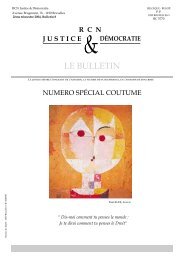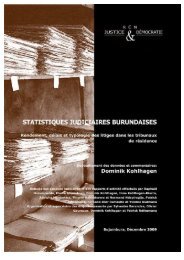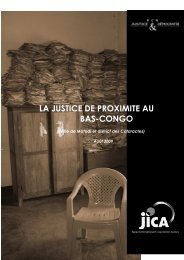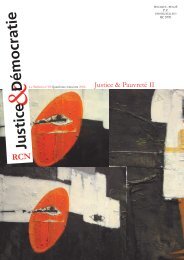Démocratie Démocratie
Extrait du Bulletin 32 - RCN Justice & Démocratie
Extrait du Bulletin 32 - RCN Justice & Démocratie
You also want an ePaper? Increase the reach of your titles
YUMPU automatically turns print PDFs into web optimized ePapers that Google loves.
Our Kigali mission has prepared a series of short articles concerning its backlog reduction project,<br />
which recently came to an end. These contributions provide an insight into both challenges and<br />
successes that were encountered and give an impression of the way forward.<br />
Rwanda Case Backlog Reduction Project<br />
The Rwandese justice system faces a problem of<br />
backlogs of criminal cases both at the level of the<br />
National Public Prosecution Authority (NPPA) and the<br />
Judiciary (the courts and tribunals). The former<br />
backlog includes cases that have to be investigated<br />
under the supervision of the prosecutors so that the<br />
case file can be completed and sent to court or dismissed.<br />
The second backlog consists of cases pending<br />
before the courts and awaiting judgment.<br />
Backlogs are problematic for two reasons. They<br />
tend to undermine the confidence of the public in the<br />
justice system and the deterrent effect of criminal<br />
law enforcement. Victims,<br />
complainants and the public<br />
in general are discouraged<br />
by the seeming inactivity.<br />
And when a response<br />
does come it is<br />
often disappointing, because<br />
so much time has<br />
gone by that the necessary<br />
evidence to reach a<br />
conviction has evaporated.<br />
Criminals, by contrast,<br />
may be encouraged to<br />
commit new crimes if<br />
chances are big that no<br />
effective response will follow.<br />
These are effects that<br />
are particularly undesirable<br />
in the Rwandese context.<br />
For a society that is<br />
trying to rebuild and progress after having experienced<br />
mass violence, the assurance that in the present<br />
timeframe crimes cannot be committed with<br />
impunity is of crucial importance.<br />
In order to contribute to the reduction of the backlogs<br />
USAID/Rwanda has awarded a grant to RCN Justice<br />
& <strong>Démocratie</strong> under the title ‘Rwanda Case Backlog<br />
Reduction Project’. This 12-month project was<br />
implemented between February 2009 and February<br />
2010.<br />
© Franck Dikisongele<br />
Backlog monitoring<br />
An important activity in this project was the monitoring<br />
of 102 trial hearings in backlogged criminal<br />
cases, which serves to keep an eye on the quality of<br />
the work on backlogs that is done both by prosecutors<br />
and courts. The observations we made can be<br />
divided into two categories (1) organizational problems,<br />
(2) questions regarding the relevance and<br />
quality of the work of the NPPA and the courts.<br />
In terms of the organization of the trials it was<br />
noted repeatedly that the courts scheduled trials<br />
without consulting with<br />
the prosecutors as to<br />
their capacity and availability<br />
on given days. Another<br />
serious problem is<br />
the fact that in many<br />
courts the parties and the<br />
public are not helped to<br />
understand where in the<br />
courthouse – in which<br />
room – their case will be<br />
dealt with or – even<br />
roughly – around what<br />
time this will happen.<br />
Both mean that trials<br />
have to be postponed,<br />
that they are conducted<br />
without key witnesses or<br />
that judgments are<br />
passed in absentia.<br />
As regards relevance and quality, it can first of all<br />
be noted that in most cases the parties are not present<br />
and the public is absent. A full 69% of the cases<br />
monitored were judged in absentia and members of<br />
the public were present in only 21 cases. Crucially,<br />
the rate of conviction of 55% is rather poor. It appears<br />
that particularly where heavy charges are involved,<br />
the prosecutors are very reluctant to dismiss<br />
a case, even if the most basic elements of proof are<br />
not available (such as a medical statement in alleged<br />
rape cases). Finally, because so many cases were<br />
judged in absentia, our observations regarding the<br />
11
















